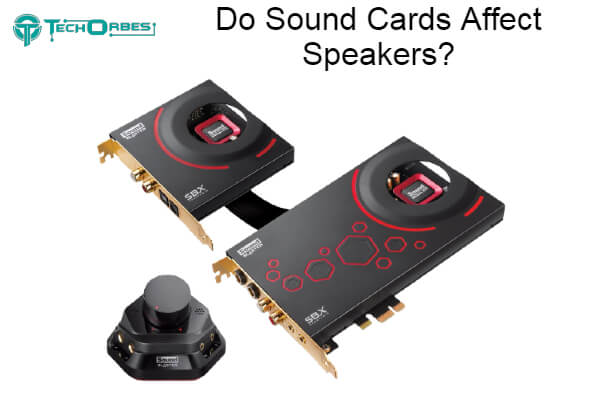Do Sound Cards Affect Speakers? Expert Guide
Let’s get started Do Sound Cards Affect Speakers? One of the more uncommon components in current PCs is the sound card. The top home computers available today don’t often come with sound cards as options.
It wasn’t always that way; in the early 2000s, the dedicated sound was a typical feature of PCs, but today, most PCs only have onboard audio built into the motherboard. Except for audiophiles and die-hard gamers, this is perfectly good.
Another thing to remember is that sound cards are now easily accessible in both internal and external forms, so there are many simple options available if you desire to improve your audio experience, especially if you possess one of the finest laptops and don’t want to open it up.
When considering purchasing a sound card, the most important thing to bear is to utilize it fully; you will also need new computer speakers or the best headphones.
Do Sound Cards Affect Speakers?
It’s true that adding a sound card to your computer will improve the quality of the audio output, but if you have a sound card and don’t have high-quality speakers or a headset, you won’t be able to tell the difference.

Although many dedicated graphics cards can now handle some of the audio load, one of the main reasons gamers utilize dedicated sound cards is the decreased CPU utilization. Your CPU or GPU’s workload is delegated to the sound card, which results in higher overall frame rates for gaming.
A non-gamer may not see the significance of this issue, yet players consider it critical. Naturally, you will also get better audio, which is perfect for games that employ surround sound to let you know where enemies are or where they are firing from.
Games like Fortnite and Red Dead Redemption 2 will also bring a little more joy to audiophiles. These video games’ sound quality and soundtracks were produced at the cost of thousands, if not millions, of dollars.
The audio that comes with your motherboard, or onboard audio, is by no means subpar and, for the majority of users, is more than adequate for daily use. Nearly everyone who knows about the subject will advise you to spend more money and obtain a high-end or professional card if you decide to buy a sound card.
Even though it will cost you a lot of money, buying a mid-range card will not make much difference. Higher-end cards come with many extra connections required for gaming, sound recording, or just plain listening to your favorite music, as well as digital input and output ports.
However, you’re essentially wasting money if you purchase a sound card to use Spotify to listen to traditional music. The proper audio files and tools are obviously necessary for dedicated sound cards to operate at their best.
What Benefit Would A Sound Card Offer?
It would give a computer that didn’t already have audio functions. Nowadays, sound processors often built into motherboards offer “good enough” audio capabilities for most purposes. Nothing prevents you from installing a higher-quality dedicated soundcard to a computer that already has sound built in.
My computer’s excellent analog sound card is connected to my hi-fi system. I use the soundcard if I want to listen to music of good quality or if I want to record my digital music on an audio cassette to listen to in the vehicle.
The onboard soundcard can handle my typical system sounds without interfering with the playback of music. Additionally, I can use Skype and play music in the background while the two remain separate.
The sound wasn’t incorporated onto the motherboard until the late 1990s and early 2000s. In the early days of PCs, a soundcard was your only option if you desired any audio functionality.
I had a 386-33 that I upgraded with a proprietary (Panasonic interface) CD ROM drive and an early Creative Labs Soundblaster 16 (for a whopping 2x speed!). It was a dated computer from 1989, but it had sound. Games improved in fun, and multimedia programs like Encarta allowed for the inclusion of sound and video.
Even with early integrated audio (such as on early PC Chips Super Socket 7 motherboards), the onboard sound was typical of low quality; however, audio performance could be improved by installing a “proper” sound card, such as the Creative Sound Blaster Audigy, and using it in place of inferior AC97 chipsets.
The Soundblaster cards could be managed with direct writes to hardware registers on the card, between the IO area between 100H and 3FFH, back when I had an early 486 DX4-100 that I had installed with three sound cards.
I created a VB6 application to control two CD drives, six stereo aux inputs, and some effects lighting via the parallel port. I also utilized a DLL to read and write directly to hardware registers to change volume levels and route inputs and outputs.
I operated a mobile disco with this setup for many years after adding two Technics turntables (with preamps) and a power amplifier. I could utilize the customized mixer to handle cueing and preface, crossfade between sources, and even leave two CDs automatically switching between songs with track segues. At the same time, I quickly went to the bar for a glass!
Conclusion
That’s conclude Do Sound Cards Affect Speakers? Get an “external” sound card if you wish to improve audio but don’t think you need a dedicated sound card. This is essentially a little processing unit that connects to your PC using a standard headphone jack or a USB port.
The result is a general enhancement in the fundamental sound that your computer or laptop emits and the ability to manipulate it from outside of it. However flexible your device’s inbuilt sound is, many gaming headsets utilize these specialist DACs to enhance and modify the audio you get.
Anyone interested in this solution is encouraged to use the HyperX Amp (opens in a new tab), which is affordable, strong, and simple to set up. What does this mean for dedicated sound cards? They are worth it for the increased sound if you’re prepared to put in the time and money to get the correct card and equipment.
If you’re more of a casual person, your motherboard’s inbuilt audio will probably be more than adequate for your music or gaming demands. An external sound card is ideal if you’re in the middle because you can plug it in and start using it immediately.
Frequently Asked Questions
Do speakers require a sound card?
Technically speaking, a sound card is an optional component. Still, it’s essential if you wish to connect an analog microphone or listen to your PC’s audio through wired headphones or speakers (much like an external DAC).
Can I use a sound card to connect speakers?
You must purchase a stereo 3.5mm/RCA male cable long enough to connect the sub to the sound card. If the distance is great, you can get 3.5mm/RCA female or just some female turn arounds and RCA cable cut to length and from the sub to the speakers, followed by some lovely (monster) speaker cable.
Does the sound card impact performance?
The performance gain from the sound card is minimal compared to integrated sound chips and newer CPUs because it simply offloads the CPU.
Does music benefit from a sound card?
Soundcards have a variety of effects. A changed soundcard will first alter the sound of your musical compositions (for better or for worse). Second, the quality of the data being processed will also alter due to the soundcard. Third, a soundcard can alter the signal’s delay and noise levels.

Since childhood, I’ve been fascinated by computer technology, and have experimented with a variety of hardware and software. It was a dream come true to graduate from a renowned university with a degree in computer engineering, which made it possible for me to pursue my dreams swiftly.
